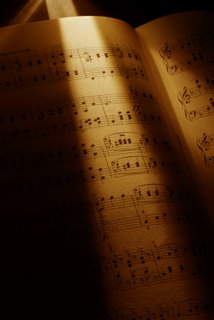
Yesterday I was reading a thread on the Piano World Forum that started with this post from a piano teacher in
- I start by studying the most basic information--notes, fingering and rhythms—as thoroughly as I know how, in order to secure the foundation before I try to do anything with style, expression or interpretation. Most often this means working phrase by phrase, at times very slowly. I try to mark fingerings clearly enough that I can discern my fingering easily when I return to the piece years later. I also practice conducting the phrases and counting carefully as I play (yes, out loud) to make my rhythmic understanding of the music clear.
- As I work through the score I also address any mechanical/technical challenges that have emerged. I attack the most difficult passages in isolation, often hands alone as necessary. My goal is always to play as slowly as I need in order to allow myself to think and hear each passage clearly. Also, as my sense of the ideal sound becomes clearer, I work to clarify the choreographic elements of the playing so that the movements of my hands/arms/body integrate with my musical ideas. In fact I have developed a certain internal mechanism. A “Yuck!” detector, you might say. Whenever my thinking or listening gets clouded over because the motor control computer has overloaded, there is this little warning that goes off inside my brain that says “Yuck!” This is the warning that says, “Pause, slow down, go back, look again, re-think, and try it again.” The weirdest aspect of this is that when I am doing my best work it is quite intuitive and almost completely non-verbal.
- I continually work to refine my sense of the ideal sound for each phrase in a composition. One game I play with my attention is to ask at every joint in the musical structure, “What’s new here?” I try very hard to find some new information or nuance that needs to be highlighted with the arrival of each new idea. Even the sameness of a repetition can bring its own kind of expectation—“Hey, if I just said this same thing again, then something different must be coming.” I work on this element through score study away from the piano initially, and then by mentally "pre-hearing" a phrase prior to playing it.
- As for listening to recordings of repertoire that I am learning, I have mixed feelings. I was taught that if one listens to recordings during the learning process, you really need to listen to many performances (5 or 6 minimum) and not just one. While this is not always practical, it can be instructive. In my own teaching, I ask my students to wait to listen until they have formed some idea of how they hear the music. Too often, hearing the CD makes them rush through the learning process too quickly. Often they are tempted to play too fast too early and the music is less thoroughly absorbed. However, I do like to work with recordings of my rehearsals. Even though I am absolutely phobic of microphones in nearly all situations, there are few things that will improve performances more efficiently than hearing recordings of my trial runs. It does help to do it often so the process is less stifling and less foreign.





No comments:
Post a Comment